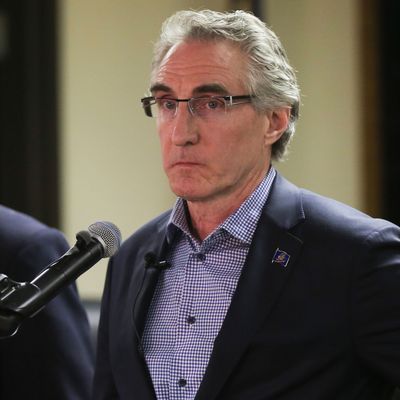
Given the already robust size of the 2024 Republican presidential field (with the high-profile politicians Chris Christie and Mike Pence joining the competition this week), you might wonder why the very obscure governor of North Dakota, Doug Burgum, is jumping into the race, and why we should care.
The answer, basically, is that Burgum is very wealthy. He built up a software company, then sold it to Microsoft for more than a billion dollars back in 2001. In 2016, he came out of nowhere to upset a heavily favored Republican officeholder and become governor of North Dakota based on a conservative-outsider persona and tons of money. Money can’t buy you everything in politics, but it can definitely buy you name ID, and if Burgum is willing to open his checkbook big time, he won’t be obscure for long, particularly in nearby Iowa, where he will hold the advantage of having grown up on a farm. (He also, interestingly enough, founded a chimney-sweep business while he was in college.)
But what is there about Burgum other than money and an odd college job to distinguish him from that very large presidential field? According to the New York Times, he and his advisers think his rivals are spending far too much time talking about culture-war issues and not enough focusing on the economy:
Mr. Burgum’s aides say he is planning a campaign less focused on social issues and more on his business background and fiscal stewardship of the state, which included cuts to both local property taxes and state income taxes. He is set to emphasize the economy, energy and national security in his early campaigning, viewing the current debate as too focused on social issues and not on voters’ biggest concerns.
In a recent interview with the editorial board of The Fargo Forum, a local news outlet, Mr. Burgum said he believed that 60 percent of American voters had been neglected as the fringes dominated political debate.
The Wall Street Journal op-ed Burgum penned to announce his candidacy to a national audience definitely reflects this disdain for cultural issues. “My hometown, Arthur, N.D., is a small farming community where woke was something you did at 5 a.m.,” he wrote. That’s his only direct or indirect reference to the issues of gender, race, sexuality, and religion that have so absorbed Republicans recently. Instead, he offers a conservative prescription for the country that sounds pretty much like what Ronald Reagan was saying in 1976:
When we empower American innovation and energy production, we strengthen the value of the dollar, stop China and Iran, and prevent wars such as Russia’s invasion of Ukraine. We need to embrace innovation over regulation to solve the challenges of the 21st century. We need to return power to the states. Together, we can ensure unlimited opportunity for everyone willing to reach for it.
The economy must be our top priority. We need to get inflation under control, cut taxes, lower gas prices and reduce the cost of living.
To be clear, the other GOP candidates in the race aren’t fools; they are waging culture battle 24/7 because that’s what an awful lot of Republican base voters want right now. But perhaps there are enough Iowa caucusgoers who are weary with the war on woke to give Burgum a “lane.” And it’s not like he’s one of those crypto-libertarians who disdain cultural issues because they harbor heterodox views on hot-button issues, as the Times notes: “This year, Mr. Burgum signed into law a near-total ban on abortion and created significant restrictions on gender transition care, including banning any requirements that teachers or school administrators use a student’s preferred pronouns.”
We’ll know soon enough if Burgum is willing to spend what it takes to make his candidacy more than a footnote and at least test the proposition that a sizable number of Republicans — and perhaps swing voters as well — just want to talk about money.
More on politics
- Trump Ambassador Picks: Who’s in His ‘Diplomatic Clown Car’
- What We Learned From the House Ethics Report on Matt Gaetz
- Everyone Biden Has Granted Presidential Pardons and Commutations






























